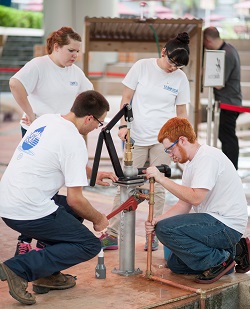24 June 2014
The impact of skills on a sustainable environment
 With World Environment Day (WED)
activities being held in countries across the globe earlier this month,
we are all reminded to have a close look at the impact we are making on
the environment. WED, a vehicle of the United Nations, encourages
worldwide awareness and action for the environment. Since 1974, it has
grown to be celebrated in over 100 countries.
With World Environment Day (WED)
activities being held in countries across the globe earlier this month,
we are all reminded to have a close look at the impact we are making on
the environment. WED, a vehicle of the United Nations, encourages
worldwide awareness and action for the environment. Since 1974, it has
grown to be celebrated in over 100 countries.
Sustainable technologies and renewable materials and processes are being used in the construction and operation of environmentally sustainable buildings such as LEED certified buildings. Leadership in Energy and Environmental Design (LEED) is a set of rating systems for the design, construction, operation, and maintenance of green buildings, homes and neighbourhoods.
Although the third party verification framework for implementing green building approaches was developed by the US Green Building Council, LEED standards have been applied to more than 7,000 projects in over 30 countries. For LEED certified buildings, they must comply with environmental laws and regulations, occupancy scenarios, building permanence and pre-rating completion, site boundaries and area-to-site ratios, among other requirements. They may incorporate renewable energy sources, educational, and healthy spaces as well.
Temperature control, lighting control, occupancy sensors, usage and recycling of unused raw materials, water usage, and overall energy usage are some of the ways that construction and restoration companies are enabling homes and buildings to reduce their impact on the environment.
Not only are energy efficient homes and buildings and construction processes contributing to a sustainable environment, but the employment opportunities in the construction and operational purposes of them are contributing to short and long term social and economic sustainability as well.
The manufacturing, construction, and installation of energy efficient homes and buildings are made possible by skilled professionals. The attention to detail that these new designs require is important to have properly trained, highly skilled workers completing the project to its specifications. WorldSkills is working with organizations and companies to constantly promote new and emerging technologies and techniques to young skilled professionals. Projects like the Water Innovation Challenge and the WorldSkills Competition highlight the need to learn new skills to ensure a sustainable future.